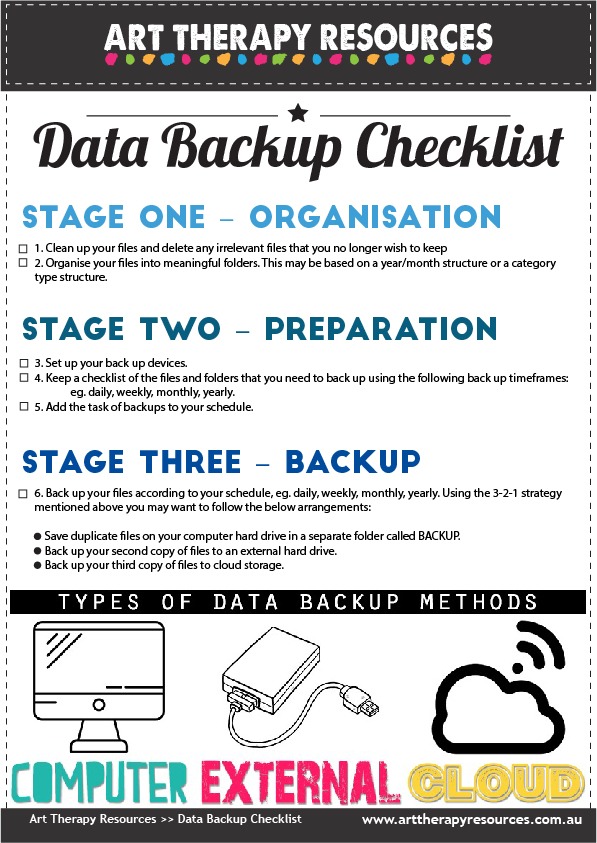THIS POST INCLUDES:
1. How your website is hosted
2. Types of website hosting
3. Comparing shared vs VPS hosting
4. Free Download Data Backup Checklist
HOW YOUR WEBSITE IS HOSTED
When you start to create a website, you will have to make a decision at some point about how you want to have your website hosted. If you’re not sure what website hosting means, it’s the equivalent of how you have a mobile/cell phone and who you choose as your carrier. Your phone provider enables you to call, text and use your phone for the internet.
Similarly, your website host stores all of the information contained in your website and then make it available for viewing to the public.
As you may have experienced with mobile/cell phones, your service is only as good as your phone providers service. Hopefully, you’ve chosen a phone carrier with excellent coverage and a strong signal so that your calls stay connected.
With web hosting, you also need to choose a provider who can deliver fast and reliable service for your website so that your readers can easily access your website in a quick timeframe. You don’t want your visitors coming to your website and seeing messages stating ‘this website is currently offline’, or having to wait a long time for your page to load.
Choosing your website host is an important decision to make based on the type of website that you have. If you have a basic website with a few pages of general information then most basic web hosts and plans will suit you. However, if you want to include more features such as message boards, ecourses, webstores, then you will want to choose a web host that provides more reliable performance demands, 24/7 support, robust security features and ability to maintain current software upgrades.
TYPES OF WEBSITE HOSTING
A web host will typically offer three different types of web hosting options:
- Shared hosting
- VPS
- Dedicated hosting
The best way to understand the difference between each type is to use a real estate analogy.
A brief description of each is below:
SHARED HOSTING
Shared hosting is similar to an apartment block. There are central amenities and an overall maintenance crew who allocates resources equally various apartments. Everyone in the apartment complex must share the car parks and access in and out of the building. Some apartment complexes may provide basic infrastructure, however, more elaborate complexes might provide additional amenities such as pool, gym, and a playground.
In a web hosting arrangement, you and other businesses are sharing server resources that enable your website to stay live on the internet. You are sharing memory, disk space, staff resources and processing speed across many websites. Web hosts do not put all of their customers on one shared server. Instead, they allocate so many websites per server to share the load.
Shared hosting is the most common hosting plan for small businesses.
VPS HOSTING
Keeping with the real estate analogy, VPS hosting is similar to a gated community. You can have your own property separate from other neighbours, however, you are all still living in the same community.
You’re still sharing some resources such as a gate and special non-essential amenities, however, you can mostly live on your own without being affected by others in the community.
VPS hosting has less sharing of resources and therefore usually is a more powerful hosting option including better performance and loading time of your website for visitors.
VPS hosting does have a higher cost and requires some additional administration, however, it also provides independence from other users.
VPS hosting is a good option for those who have multiple websites. You may have a website for your therapy practice and you may also have a website for any ecourses or online workshops that you provide.
DEDICATED HOSTING
Dedicated hosting is explained by the most extensive real estate option – owning your own home. You have a dedicated server available for your website only and no other website/business will share your server resources.
Dedicated hosting offers maximum control over your server and therefore provides a more efficient and robust performance for your website.
As expected with more resources, this option costs more than the Shared and VPS hosting options. It also requires more knowledge to administer, manage, and update your server software. This work is often conducted by your web host at a premium price.
Dedicated hosting usually provides a service beyond the needs of small therapy practice.
Comparing shared vs VPS hosting
The main web hosting options that a small private practice should consider for their website is between the Shared and VPS Hosting options.
To use the real estate analogy again. Shared hosting is similar to a group of businesses all being in the same room sharing tables, chairs, power points, and other resources. In this setting, you are sharing more resources and may have to wait while another business uses some resources before you.
Conversely, a VPS hosting plan is like a building with individual offices and each business has their own office space. In a VPS hosting plan you are still all sharing the same building, however, if you have own office space with its own resources.
The main criteria to review when choosing your options and ultimately your web host plan is listed below:
- Server resources
- Performance
- Security
- Cost
More detail about these criteria options are below:
SERVER RESOURCES
On a shared hosting network, your business shares the server resources amongst each other. Hosting companies typically limit the number of business that share resources, however, your website, or another website, can go through periods where web traffic to your website will peak. This might happen if a blog post goes ‘viral’ or a sale is offered.
You can’t choose what other businesses your website shares server resources with, so you may find yourself sharing resources with a website that offers weekly sales. This continuous spike in traffic each week could impact the resources available to your website and you may experience temporary outages if another site has higher traffic.
Alternatively, if you require extra traffic bandwidth, you may find a shared server doesn’t provide you with enough server resources to meet your demand.
Web host companies do try and ensure that their customers are not disadvantaged by sharing server resources, however, it is a factor to consider if out of the ordinary web traffic occurs and the web hosting company is not able to correctly allocate resources.
VPS hosting offers more accessibility of disk space and a higher availability of resources for your website needs.
PERFORMANCE
Performance of your website is affected by the amount of server resources allocated to your plan. As mentioned above, Shared hosting plans share resources with other business and websites, and this, in turn, affects performance.
If you have a basic website with only a few information pages such as About Us, Contact Us and a Homepage, then your website won’t be impacted by poor performance as your website will place a limited load on the available server resources.
A VPS hosting plan will provide more dedicated resources of the server to your website.
Some of the most common issues of performance affect tasks such as:
- Loading information and images to your website
- The speed that your website loads as your readers initially visit your website
- The speed that your website takes to load additional pages as readers move around your website
SECURITY
Web hosting companies take security very seriously. Regardless of whether you have a Shared hosting plan or VPS hosting plan, you should feel confident that the web host you use is providing you with the tools for necessary security.
There is a slight increase of risk in using a Shared hosting plan vs VPS hosting plan for security. Due to the sharing aspect within Shared plans, it is possible that the security exposure of another website sharing your server may expose your website to potential problems.
If your website only has a few pages of content that doesn’t hold important data, then this may not be a huge risk for you. However, if you have a website that processes payments or stores customer data in any format, then it is best to limit your exposure to security risks as much as possible.
Security breaches can be incredibly difficult to understand and manage. As a small business owner with a website, it is difficult to take control of a security breach if it occurs due to the tech skills required to fix your website. Your web host will usually do a lot of the work for you, however, you often need to make decisions about how to manage your website through a security breach. This level of stress can be difficult to deal with when you are trying to operate your daily business and have a limited understanding of website security.
COST
The cost of a Shared hosting plan is usually cheaper than a VPS plan. This is because the running costs of a server is shared amongst a variety of businesses. Shared hosting plans often offer very limited services, however, this can suit your website requirements if you only have a small number of pages on your website.
VPS hosting does cost more, however, you are often provided with more server resources, better performance, increased security, and additional tech features that help you run your website. This could include more complex backups, quicker support from your host, and access to software to help your website become more functional.
HOW TO DECIDE ON A PLAN
There are pros and cons for each plan whether it be Shared hosting or VPS. The most important choice is ensuring that you choose a reputable company for your hosting in general as they will work hard to ensure that your website will be looked after whether you use Shared hosting or VPS hosting.
Performance, security, and cost are the main factors to consider when deciding on a plan for your website host. Each website has its own needs and these needs dictate whether you should choose a Shared plan and save some money, or invest in more resources through a VPS plan.
If you have a simple website that exists purely for providing information about your therapy practice and your services, then a Shared hosting plan will suffice. However, if you intend to have a more complex website that contains a store to sell products, or a classroom for online classes, or any capacity to store customer data, then you should consider the benefits of having a VPS hosting plan instead. A VPS hosting plan will allow your website to grow in size, scale, and complexity of how you can interact with your readers and potential clients or customers.
FREE DOWNLOAD: Data Backup Checklist
SIGN UP below to download the FREE Data Backup Checklist to help you set up your business backup strategy.
Download the FREE Data Backup Checklist.

BUILD YOUR ART THERAPY REFERENCE MATERIALS:
Pin this image to your Pinterest board.

SHARE KNOWLEDGE & PASS IT ON:
If you’ve enjoyed this post, please share it on Facebook, Twitter, Pinterest. Thank you!
